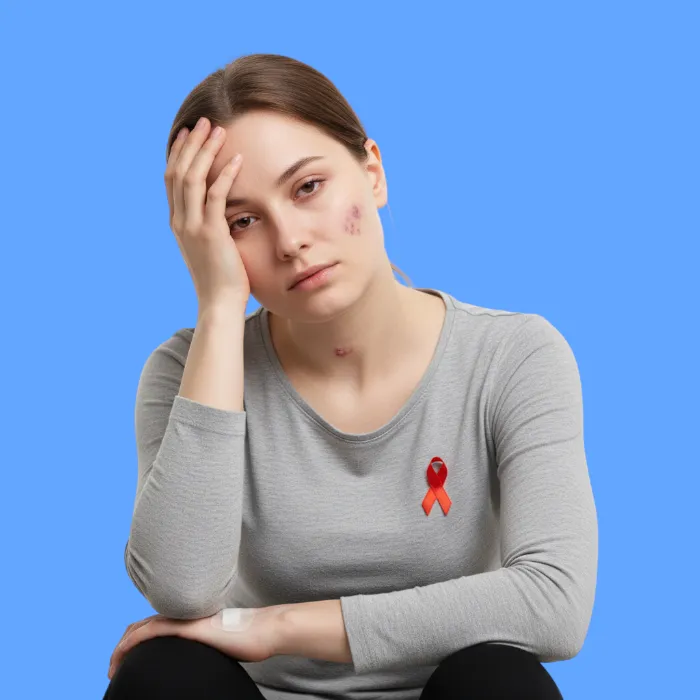What is AIDS disease?
AIDS is the advanced stage of infection with the human immunodeficiency virus (HIV), a virus that gradually attacks and weakens the immune system.
Over time, the body becomes unable to fight off infections and minor illnesses, making the patient vulnerable to serious complications. AIDS does not appear suddenly; it develops over years if left untreated, and the infected person may not feel any symptoms at first.
What are the causes of AIDS infection?
AIDS infection occurs when the virus is transmitted from an infected person to another through various means, including:
- Unprotected sexual intercourse with an infected person
- Receiving blood contaminated with the virus
- Using contaminated sharp tools like needles or razors
- Sharing drug injection equipment
- Transmission from an infected mother to her baby during pregnancy, childbirth, or breastfeeding
- Failure to follow preventive measures in high-risk environments
What are the common symptoms of AIDS?

AIDS symptoms vary depending on the stage and may begin with mild signs that gradually worsen. These include:
- Persistent high fever
- Unexplained weight loss
- Severe night sweats
- Chronic diarrhea
- Swollen lymph nodes
- Frequent oral infections like thrush
- Constant fatigue
- Unexplained skin rashes or spots
When should you see a doctor?
It is recommended to consult a doctor immediately if unexplained symptoms appear or after exposure to risk factors, such as:
- After unprotected sex with someone of unknown health status
- Using unsterilized sharp tools
- Experiencing symptoms similar to AIDS
- Discovering a family member is infected
- Injecting drugs
- Feeling a general weakness in immunity
What are the treatment methods for AIDS?
Although there is no complete cure, effective medications help control the virus and improve quality of life. These include:
- Antiretroviral therapy (ART)
- Regular medical follow-ups and blood tests
- Treating associated infections
- Supporting healthy nutrition
- Practicing light physical activity regularly
- Psychological therapy and social support
- Avoiding secondary infections
- Strict adherence to medication schedules
Can AIDS be cured?
Currently, there is no complete cure for AIDS, but the virus can be effectively controlled.
Early treatment and commitment to medication allow the patient to live a nearly normal life and reduce the risk of transmitting the virus to others.
What are the prevention tips for AIDS?
Preventing AIDS depends on avoiding infection sources and maintaining healthy behaviors. These include:
- Using condoms during sexual activity
- Avoiding sharing sharp tools
- Regular testing for sexually transmitted infections
- Avoiding drug injection
- Ensuring blood safety before transfusion
- Following preventive measures in medical professions
What are the possible complications of AIDS?
If left untreated, AIDS can lead to serious complications affecting various body systems, such as:
- Opportunistic infections like tuberculosis and pneumonia
- Cancers linked to immune deficiency
- Nervous system issues like memory loss
- Cardiovascular diseases
- Kidney and liver disorders
- Severe weight loss and malnutrition
- Chronic skin problems
- Depression and anxiety
Frequently asked questions about AIDS
Can AIDS be transmitted through handshakes?
No, it cannot be transmitted this way.
Can someone with AIDS live a normal life?
Yes, if they follow treatment and regular checkups.
Can AIDS be transmitted through saliva?
No, except in very rare cases.
Can the infection be detected immediately?
No, the virus needs an incubation period before appearing in tests.
Article Summary
AIDS is a serious health condition caused by HIV that directly affects the immune system.Prevention starts with awareness, and early treatment gives the patient a chance for a stable and normal life.
Breaking the fear and stigma is essential, and dealing with the disease requires responsibility and understanding.